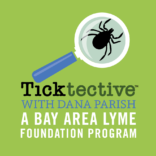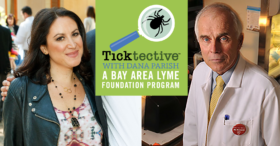Ticktective Podcast Transcript
 In this wide-ranging conversation, Dana Parish talks with eminent veterinarian Dr. Edward Breitschwerdt about Bartonella infections, the diseases and symptoms presentations in humans, how the bacteria are transmitted, and how doctors often miss Bartonellosis as the root causes in sudden onset of psychosis, frightening behavioral changes, and inexplicable physical deterioration in humans. Note: This transcribed podcast has been edited for clarity.
In this wide-ranging conversation, Dana Parish talks with eminent veterinarian Dr. Edward Breitschwerdt about Bartonella infections, the diseases and symptoms presentations in humans, how the bacteria are transmitted, and how doctors often miss Bartonellosis as the root causes in sudden onset of psychosis, frightening behavioral changes, and inexplicable physical deterioration in humans. Note: This transcribed podcast has been edited for clarity.
Dana Parish: Welcome to the Ticktective Podcast, a program of the Bay Area Lyme Foundation, where our mission is to make Lyme disease easy to diagnose and simple to cure. I’m your guest host today, Dana Parish. I’m the co-author of the book Chronic, and I’m on the advisory board of Bay Area Lyme Foundation. This program offers insightful interviews with clinicians, scientists, patients, and other interesting people. We’re a nonprofit foundation based in Silicon Valley, and thanks to a generous grant that covers a hundred percent of our overhead, all your donations go directly to our research and our prevention programs. For more information about Lyme disease, please visit us at us at bayarealyme.org.
Hi, I’m Dana Parish, and I’m so honored to be the guest host today for the Ticktective Podcast on behalf of Bay Area Lyme Foundation, of which I am a very proud advisory board member, and we are thrilled to welcome Dr. Ed Breitschwerdt today. He is the Melanie S. Steele, Professor of Medicine and Infectious Diseases at North Carolina State University College of Veterinary Medicine. He is also an adjunct professor of medicine at Duke University Medical Center. And we could read a bio for you that goes on forever because you are so incredibly distinguished. You’re the world’s leading expert, in many people’s opinions on, Bartonella, which is one of the main reasons that we’ve been brought together to talk here today. Thank you so much for agreeing to do this podcast and for being such an incredible ally and champion for this cause and this community and such a diligent, brilliant researcher and personally a friend. I really appreciate you, Ed. Thank you for being here. How did you get into this? A world of Bartonella?
Dr. Edward Breitschwerdt: I became a member of the American Society of Rickettsiology as a veterinary internist trying to understand Rickettsia. I was welcomed by members of the organization and a Rickettsiologist at CDC, Dr. Russ Regnery, at one of the national meetings, presented an abstract. That abstract was to tell us as an audience that they had finally found the organism that caused cat scratch disease. And that organism was a Bartonella that became Bartonella henselae, a bacteria. The thing I always liked about Dr. Regnery is he was a very basic microbiologist and Rickettsiologist, and I was a clinician trying to understand the basic concepts of these bacteria and the diseases they cause. So, the next morning we actually ended up having breakfast at the same table when I asked him how difficult Bartonella was to isolate, and he said: ‘If I could find three feral cats in Raleigh, I could come up with at least one and probably two isolates,’ which really says anybody that is very kind, very benevolent and out there feeding and getting scratched by feral cats, really needs to be careful. So, we knew that fact 30 years ago, when Bartonella henselae was first (discovered). So, the initial research in our laboratory focused on Bartonella and cats.

